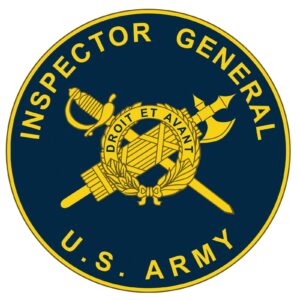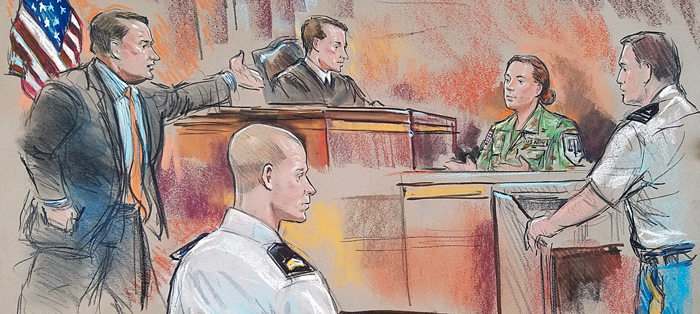The military lawyers at the Law Office of Will M. Helixon, with offices conveniently located in Vilseck and Wiesbaden, Germany, are an exceptional team with extensive experience in various military justice and administrative law positions within the JAG Corps. Combining their collective expertise of over 45 years in the military, Will M. Helixon and John Caulwell have dedicated their careers to providing guidance on a wide range of legal matters, including Affirmative Administrative Actions, both in response to and for submission. These Affirmative Administrative Actions are typically initiated on behalf of clients seeking action or change from another individual, a member of the command, or a commander.
If you have attempted to resolve your military issue by approaching your supervisor or chain of command but have received minimal or no response, it may be time to consider utilizing Affirmative Administrative Actions. These actions compel the individual or command to provide a written response to your grievance. At the Law Office of Will M. Helixon, our team of military lawyers has assisted clients of all ranks in effectively navigating the affirmative administrative process to obtain answers. If you have exhausted all other options and your chain of command or leadership continues to evade or disregard your request, contact the Law Office of Will M. Helixon for expert assistance in seeking the answers you deserve. We will support you in submitting an Affirmative Administrative Action, demanding the resolution to the questions you seek. Don’t hesitate—call us today to initiate the process of obtaining the answers you need.
What Are Affirmative Administrative Actions?
Affirmative Adverse Administrative Actions serve as effective tools for soldiers seeking answers to pressing legal questions and inspiring members of the command to take necessary action. Although these actions are not adverse to the Soldier filing them, they certainly have adverse implications for the individuals against whom they are filed. The purpose of these actions is to prompt the command or fellow Soldiers to address perceived grievances on behalf of the filing soldier. The following are examples of Affirmative Adverse Administrative Actions:
Complaints submitted by Soldiers under Article 138, UCMJ, seeking redress for alleged wrongs committed by their commanding officer.
Article 139, UCMJ, Claims, which empowers commanders to investigate allegations of wrongful taking or willful damage to property by Soldiers. In certain cases, the Article 139 claims process enables a commander to direct the Finance Office to compensate victims from the wrongdoer’s pay.
Congressional Inquiries, whereby Soldiers submit complaints to their Congressman, seeking assistance in matters involving themselves, the U.S. Army, or the Department of Defense (DoD).
Inspector General (IG) Complaints, where Soldiers have the right to present complaints, grievances, or requests for assistance to the Inspector General (IG). These complaints may include allegations of fraud, waste, and abuse, among other concerns.
If you are considering submitting any of these Affirmative Administrative Actions, it is advisable to seek guidance from the knowledgeable team at the Law Office of Will M. Helixon. They can provide expert advice on the best course of action for your specific situation.
What is an Article 138 UCMJ Affirmative Administrative Action?
An Article 138 UCMJ Complaint is an Affirmative Administrative Action that allows Soldiers to seek redress for alleged wrongs committed by their commanding officer. If redress is denied, Soldiers have the option to file a formal complaint against the commanding officer. The complaint is addressed by the officer who holds general court-martial jurisdiction over the officer being accused.
These procedures, governed by AR 27-10, Chapter 19, aim to provide Soldiers with an official and reliable channel to request redress from their commanding officers. It is important to note that Soldiers must utilize this procedure when there is no existing forum available for appeal or review, such as for a GOMOR, performance evaluation, or nonjudicial punishment. The Article 138 UCMJ Complaint consists of two stages:
Seeking Initial Redress: Soldiers should submit an initial request for redress in writing, signed by the complainant (email is sufficient), to the commanding officer responsible for the alleged wrong. This request must clearly identify the relationship between the complainant and the respondent (commanding officer), describe the nature of the wrong, and specify the desired redress. The commanding officer has fifteen days to respond to the request.
Formal Complaint to the General Court-Martial Convening Authority (GCMCA): If the initial request for redress is denied, Soldiers can proceed to file a formal complaint through the chain of command to the GCMCA within ninety (90) days. The formal complaint must be in writing and include the Soldier’s current military organization and address, the commanding officer who committed the alleged wrong, the date of the initial request for redress, and the outcome of the request. The complaint should provide a detailed account of the wrongful act, explain why it is considered wrong, and state the specific redress sought. Supporting documents, such as the initial request and the commanding officer’s response (if any), should be attached for consideration. The officer exercising GCM jurisdiction may deny redress, grant appropriate redress, or recommend that an officer or agency with the necessary authority provide appropriate redress.
What is an Article 139 UCMJ Affirmative Administrative Action?
An Article 139, UCMJ, Claim is an Affirmative Administrative Action provided under the UCMJ to offer restitution to victims of theft or willful damage caused by a Soldier. This claim can be filed by any individual (civilian, local national, or military), business entity, or non-profit organization affected by such actions. It’s important to note that Article 139, UCMJ, does not cover claims for property damage resulting from negligence (e.g., traffic accidents), death, or personal injury. If a claimant’s property has been stolen, intentionally destroyed, or damaged by a Soldier, they may be eligible to seek compensation by filing a claim under Article 139 of the Uniform Code of Military Justice (UCMJ) against the responsible Soldier.
In general, an Article 139 claim must be submitted in writing within 90 days of the loss or damage. However, there is a provision to extend the filing period for good cause, which includes situations where the claimant was unaware of their rights under Article 139. It is advisable to file and process Article 139 claims as promptly as possible to ensure that valid claims are paid before the Soldier in question is no longer in service and no longer subject to military pay withholding. Under Article 139 of the Uniform Code of Military Justice (UCMJ), commanders have the authority to investigate allegations of wrongful taking or willful damage to property by Soldiers. In certain circumstances, the Article 139 claims process empowers commanders to direct the Finance Office to compensate victims from the wrongdoer’s pay. Army Regulation (AR) 27-20, Claims, Chapter 9, governs Article 139 UCMJ Claims.
What is a Congressional Inquiry in the Military (Affirmative Administrative Action)?
In the military, a Congressional Inquiry occurs when a Soldier, as a constituent of a member of Congress, requests their Congressman’s assistance in seeking information from the military command regarding a wrong or improper action taken against them. Federal law grants constituents the right to correspond with their elected officials, allowing interested parties to seek assistance in matters involving themselves and/or the Department of Defense (DoD).
Members of Congress hold their office through the votes of their citizen constituents. As elected representatives, they are willing to support Soldiers by initiating a Congressional Inquiry on their behalf to inquire about the status of their case or complaint with a federal agency or department. The Department of Defense takes a proactive interest in addressing constituents’ issues and ensures that each inquiry receives fair consideration, equitable treatment, and a timely response. Regarding DoD Congressional Inquiries, the Office of the Assistant Secretary of Defense for Legislative Affairs is responsible for coordinating information requests from Congress.
Military Congressional inquiries are primarily utilized to gather information that is not being provided to the Soldier, escalate a pending issue to a higher level of command, and compel the command to address an issue that they have previously ignored or neglected. By involving their elected officials, soldiers can seek resolution and accountability for their concerns.

What is an Inspector General (IG) Complaint or Affirmative Administrative Action?
An Inspector General (IG) complaint is an Affirmative Administrative Action that allows a Soldier or any interested party to request general action when they believe there has been a violation of law or regulation. All Army IG complaints and investigations are governed by AR 20-1, Inspector General Activities and Procedures. Complaints, allegations, or requests for assistance can be presented to an IG in various ways, including in person, by telephone, FAX, regular mail, or electronically. To initiate a complaint, a Soldier can submit a request for action form called the Inspector General Action Request, DA Form 1559.
IG investigations serve as an additional avenue for commanders and directing authorities to address allegations of impropriety. The primary goal of IG investigations and investigative inquiries is to efficiently and effectively resolve allegations of impropriety. This is achieved by gathering evidence, assessing its credibility, analyzing it against established standards, and presenting the findings in a well-written report. IGs may investigate a range of issues, including violations of policy, regulations, or laws, mismanagement, unethical behavior, fraud, or misconduct. However, IGs provide the command an opportunity to resolve allegations internally before initiating their own investigations. Therefore, when appropriate, IGs will refer allegations that are suitable for command resolution to the respective command in accordance with guidance from the directing authority. If an allegation is of a criminal nature, it will be referred to the Criminal Investigation Division (CID). Directing authorities may choose to opt for an IG investigation or investigative inquiry when extreme discretion is necessary or when a command investigation is unlikely to be efficient or effective. Once an IG initiates an investigation or investigative inquiry, they will conduct a thorough investigation to determine if the allegations are “substantiated” or “not substantiated,” and identify any issues that are “founded” or “unfounded.”
How can the Law Office of Will M. Helixon Assist a Soldier Submit an Affirmative Administrative Action?
When a Soldier submits an Affirmative Administrative Action, they are seeking assistance to compel the command to take specific action or provide answers to questions related to their military service. When all other attempts to resolve the issue have proven unsuccessful, it may be time to consider submitting an Affirmative Administrative Action.
At the Law Office of Will M. Helixon, we are prepared to leverage our years of collective experience to craft your Affirmative Administrative Action. We will develop a request for action that is tailored to your specific circumstances and supported by factual evidence. Understanding what to request when submitting an Affirmative Administrative Action is crucial. If you are contemplating filing an Article 138 UCMJ complaint, an Inspector General complaint, or a Congressional Inquiry, we encourage you to contact one of our military lawyers at the Law Office of Will M. Helixon for an immediate consultation. We will carefully analyze your concerns and devise the most effective request for action, seeking necessary changes or answers from your command or other relevant individuals. Knowing what to seek and how to articulate your request is essential in obtaining the answers you are entitled to. Call the Law Office of Will M. Helixon today. Will M. Helixon and John Caulwell, armed with over 45 years of combined military experience, are ready to assist you. We will develop a strategic approach to obtain answers from your command and others. Don’t allow your questions to go unanswered. Take action and call us today.

More about the Law Office of Will M. Helixon.
Will M. Helixon established the Law Office of Will M. Helixon in February of 2016. Originally headquartered in Kansas City, Missouri, the firm’s original mission was to defend members of the military in courts-martial, adverse administrative proceedings and other criminal proceedings. Today, the firm has worked as military lawyers in multiple complex and high-profile military cases. The firm now handles most military matters, including medical issues involving the MEB/PEB process, adverse administrative matters, military justice matters including Nonjudicial Punishment, Administrative Separation Boards, and Boards of Inquiry, and legal assistance matters, including rebutting GOMORs, responding to QMP Boards, fighting attempts to revoke Soldier’s security clearances, and submitting matters for the correction of military records. The firm also assists officers navigate the minefield of findings of adverse information (AAIP) in AR 15-6 Investigations (command directed investigations), Selection Boards (Promotion Boards), Special Selection Boards, and Special Selection Review Boards (SSRB). No longer in Kansas City, the firm now has European offices physically located in Vilseck, Germany and in Wiesbaden, Germany. Call us today to assist with your legal issue in Europe, Germany, or the United States. All military lawyers at the Law Office of Will M. Helixon maintain licenses to practice before all military trial courts.
Vilseck: Law Office of Will M. Helixon – Vilseck – Germany, Hans-Ohorn-Platz 7, First Floor, 92249, Vilseck, Germany.
Wiesbaden: Law Office of Will M. Helixon – Wiesbaden – Germany, Walking Platz, 65183, Wiesbaden, Germany.
Germany +49 (0)152 2990 0341
United States (913) 353-6466



